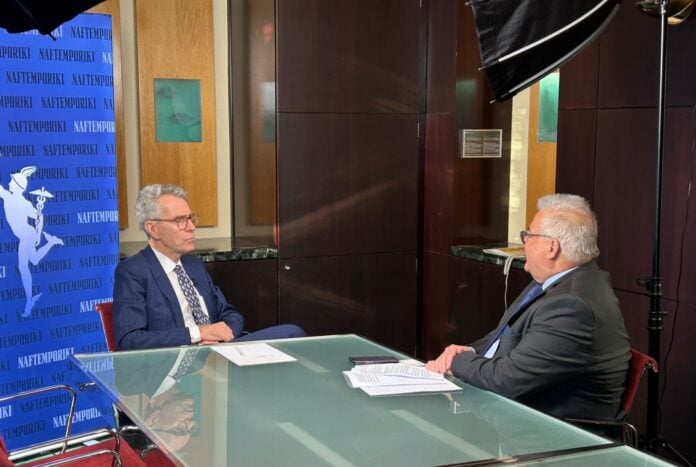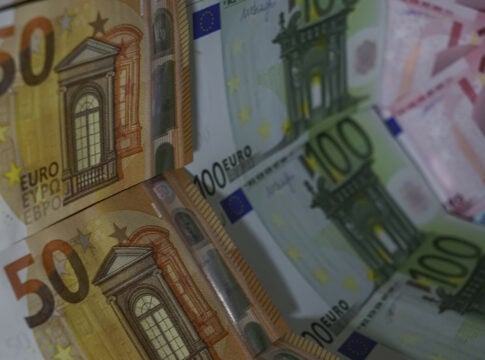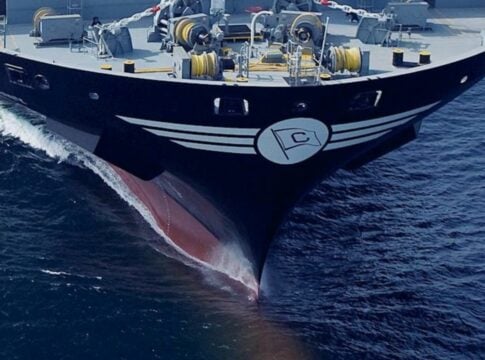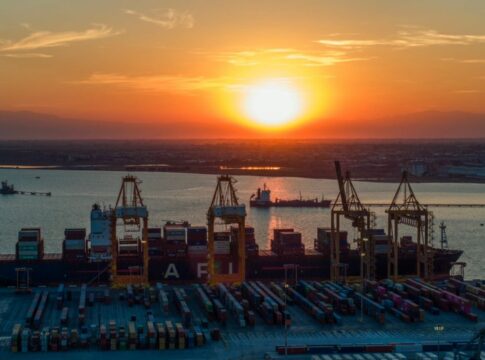Greece’s transformation into an energy hub is amazing, Assistant Secretary at US Department of State Geoffrey Pyatt said in an exclusive interview with “Naftemporiki” and Michalis Psilos.
Former US Ambassador to Athens, Geoffrey Pyatt, is responsible at the State Department for Energy Resources and came to the Greek capital to participate in a workshop organized by the European Commission in collaboration with the Greek Ministry of Environment and Energy.
“The fact that the European Union is hosting this event here, together with Environment Minister Theodoros Skylakakis and Deputy Minister Alexandra Sdoukou, really highlights the amazing transformation that characterizes Greece, which has become an energy hub for all of Southeast Europe. We see huge progress in renewable energy sources, but also many possibilities of exploiting the new infrastructures,” Pyatt emphasized to “Naftemporiki.”
“The Alexandroupolis LNG Terminal, the expansion of Revythoussa, the Greece-Bulgaria Interconnector Pipeline (IGB), contribute to the reduction of Russia’s ability to use its energy resources to control all Southeastern Europe,” he added.
The “Vertical Corridor”
The US official expressed the strong interest of the United States in the “Vertical Corridor” of natural gas transport from Greece to Bulgaria, Romania, Hungary, Slovakia, Moldova and Ukraine, through the connection of existing and new European natural gas and LNG transport infrastructure.
Asked if the “Vertical Corridor” was something like a dream for him, he replied:
“Well, it is the dream of the US government. The entire US government supports this idea,” he stated and explained: “The purpose of this Corridor is to create an energy route from Greece to Ukraine and central Europe. Thus, central Europe is particularly positive about this initiative, as the EU has made huge progress towards its independence from Russian energy supplies.
Europe is never going to see Russia as a reliable energy supplier again, but natural gas is going to be an important part of the overall European energy mix for years to come. So, we have to create these new architectures, to differentiate the routes that will allow the delivery of supplies.”
Pyatt even expressed the hope that “a large part of the US LNG, coming to Revythoussa, and to Alexandroupolis, will bring great benefits not only for Greek companies and Greek consumers, but all the way through Bulgaria, Romania, Serbia, North Macedonia and Ukraine.
“Energy independence from Russia”
The “Vertical Corridor” will also ensure that “Russia and Gazprom will not be able to earn revenue from energy exports, which they then use to make bombs and missiles,” Pyatt noted, stressing that Europe can become completely independent of Russian natural gas. I lived in the European Union until May 2022. Therefore, I saw the shock that Europe suffered. One of my last public appearances before completing my term as Ambassador was the opening of the Alexandroupolis facilities with the Prime Minister of Bulgaria. And this happened just after Gazprom had cut off gas supplies to Bulgaria. There was a real sense of fear. Today, Europe has reduced dependence on Russian energy to 15% from 40%, perhaps even lower.”
Alexandroupolis is a hub
Asked about the transformation of Alexandroupolis into an important hub for the EU’s energy infrastructure, the US deputy secretary emphasized the importance of the Evros capital for Europe’s energy security: “The next steps concern the completion of the natural gas pipeline from Greece to North Macedonia. I met with the CEO of DESFA and saw that this is on track.
Just yesterday, there was also the announcement of a Memorandum of Cooperation between North Macedonia and Serbia to build another natural gas pipeline there.
There will also be various investments in infrastructure that must be made to facilitate the “Vertical Corridor.” Instead of spending billions of dollars to build a new pipeline, we’re talking about just a few hundred million to remove bottlenecks and make an investment in the region’s future energy security.”
On Eastmed
Referring to plans to build the EastMed pipeline to transport Eastern Mediterranean gas to Europe via Greece, Pyatt stressed: “The first thing that needs to happen is to figure out how to get more gas from the Eastern Mediterranean in the market. One of the things that my current job has helped me understand much better is how important Israel’s offshore natural gas resources are. Much of this development has been undertaken by the US company Chevron. I am working closely with Chevron and the Government of Cyprus to explore opportunities in order to develop Cyprus’ energy resources. And then there’s Egypt. All these countries are working on similar resources, with great potential. But as natural gas is a transition fuel, the real challenge is how we will get this product to market as quickly as possible.”
Electrical interconnection of Greece-Cyprus
The other thing we are very excited about is the prospect of increased electrical interconnection. We are very supportive of the large undersea electricity interconnection between Cyprus and Greece. Pyatt also welcomed the “Gregy” project, which concerns the electrical interconnection of Egypt with Greece with an undersea electrical cable and the possibility of two-way energy transfer. An EU-backed project, with a total budget of 4.2 billion euros, that will transfer 100% clean energy – wind and solar – from Egypt, to Northern Greece and then to the European grid. A project of strategic importance as “we see a huge increase in energy demand in Europe, as well as in the United States. For artificial intelligence, new data centers, electric vehicles, a whole new electrified economy, which will enhance our ability to develop infrastructure and use these resources intelligently,” he underlined.
“Floating wind turbines from the shipyards of Elefsis”
Asked about plans to build offshore wind farms in the Aegean, the US official stressed that “Greece is already a regional leader, both in onshore wind and offshore wind. I saw it during my time as Ambassador in Athens: A huge development of Greece’s offshore wind capacity. I think the next stage will be the construction of floating offshore wind farms and this is an area in which we hope that Greece will play a regional leadership role. I am very proud of the work my team has done in this area. But also the team of Ambassador George Tsunis who promoted the idea of utilizing the shipyards of Elefsis. The Elefsis shipyards will not only be for shipbuilding, but also to support the development of floating offshore wind energy. It’s all about how we build energy supply chains for the clean energy transition.”
Cooperation with Turkey
After Athens, Pyatt is going to Istanbul to participate in a conference of the Atlantic Council institute on the issue of energy and the question we raised is about the possibility of energy cooperation between Greece and Turkey: “This is already happening through the ‘Southern Corridor’ natural gas transmission and the IGB pipeline, which depends on the cooperation between the Turkish BOTAS and DESFA, and would not exist without this cooperation,” he explained.
The Southern Natural Gas Corridor project aims to increase and diversify Europe’s energy supply by bringing natural gas resources from the Caspian Sea to European markets.
“I have been impressed by the leadership of Prime Minister Kyriakos Mitsotakis for the stabilization of relations with Turkey,” the US official noted. “The Minister of Foreign Affairs, George Gerapetritis, and the Deputy Minister Kostas Fragogiannis have also done such a good job in the areas of economic cooperation. These plans will evolve based on market “signals” and overall political relationships, and that is in the hands of the leaders.
– In other words, it will strengthen the climate of friendship that we see today between Athens and Ankara….
Exactly. But there is always the question: What comes first? It is a chicken-and-egg situation. That’s a problem,” Pyatt pointed out.
“End the violence in the Middle East”
Concluding the interview, the US Deputy Secretary of State was asked about the dramatic developments in the Middle East and the fear of a generalized war between Israel and Iran.
“We all hope that diplomacy will get the upper hand at this stage,” the US official said. “But we have to remember where this started: It began on October 7, 2023, exactly one year ago, with the violent attack by Hamas against the people of Israel.
Foreign Secretary Anthony Blinken is working to find a solution every day. The main thing right now is to focus on diplomacy. We certainly understand how directly Greece is affected by this crisis, but also the important role that Athens will play, when the day comes, when we will focus our attention not in crisis management, but in reconstruction. The construction organization CCC, based in Athens, is after all the main provider of electricity in the Gaza Strip. And this issue of how we see energy in a future scenario, as a driver of regional cooperation, will come back to the fore. But first we have to end the violence.”














